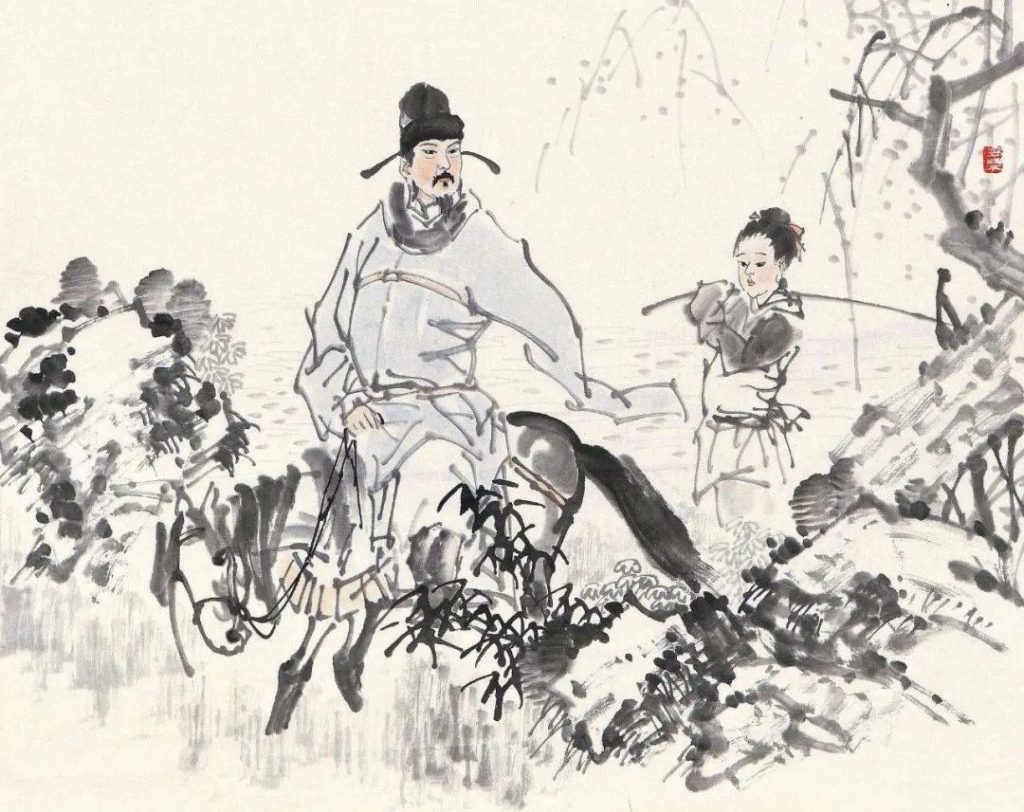Bai Juyi (772-846 CE), also known as Po Chü-i in the Wade-Giles romanization, was a prolific and influential Chinese poet of the Tang dynasty. His poetry, characterized by its clarity, accessibility, and empathy towards common people, resonated deeply not only in China but also in neighboring countries such as Japan. In Japan, Bai Juyi’s impact has been profound, leading to a lasting reverence for his literary works and his humane ideals. This article explores the reasons behind Bai Juyi’s high regard in Japan, examining his life, works, and enduring legacy.
See also: Why is Du Fu Called the Epitome of Tang Dynasty Poetry?
1. Bai Juyi’s Life and Background
Bai Juyi was born in Taiyuan, Shanxi province, China, during the Tang dynasty—a period known for its cultural flourishing and cosmopolitanism. He received a classical education and pursued a career in government service, rising to prominent positions including governor of several provinces. Bai Juyi’s administrative posts exposed him to the plight of common people, inspiring much of his poetry that reflects empathy for their struggles and aspirations.
2. Literary Style and Themes
Bai Juyi’s poetry is celebrated for its simplicity and emotional resonance. He mastered various poetic forms, including regulated verse (lüshi) and folk-style poetry (jintishi), demonstrating a versatility that appealed to a wide audience. His themes range from nature and everyday life to social justice and the human condition. Bai Juyi’s ability to express profound ideas in accessible language endeared him to generations of readers, both in China and abroad.
3. Humanism and Empathy
One of Bai Juyi’s defining characteristics is his humanistic approach to poetry. He often depicted the struggles of ordinary people, highlighting their joys and sorrows with compassion and understanding. This humanism resonated deeply with readers across cultures, fostering a universal appeal that transcended geographical boundaries.
4. Bai Juyi’s Influence on Japanese Literature
Bai Juyi’s influence on Japanese literature can be traced back to the early medieval period, when Japanese poets and scholars discovered his works through Chinese texts and translations. His poetry’s directness and emotional depth struck a chord with Japanese sensibilities, leading to a widespread admiration for his literary achievements.
5. Translation and Reception in Japan
The transmission of Bai Juyi’s works to Japan was facilitated by Buddhist monks and scholars who traveled between China and Japan, bringing with them Chinese literature and cultural insights. Early translations of Bai Juyi’s poetry into Japanese helped popularize his works among Japanese literati and the broader populace.
6. Bai Juyi’s Popularity in Heian Japan
During Japan’s Heian period (794-1185 CE), Bai Juyi’s poetry gained significant popularity among courtiers, poets, and intellectuals. His themes of nature, love, and social justice resonated with Japanese poets such as Fujiwara no Kintō and Ōshikōchi no Mitsune, who emulated his style and adapted his poetic techniques to Japanese forms.
7. Cultural Exchange and Literary Influence
Bai Juyi’s impact on Japanese literature extended beyond his poetic style. His emphasis on moral integrity, ethical governance, and compassion resonated with Japanese intellectuals who sought to reform society and uphold Confucian values. His works influenced the development of Japanese poetry, contributing to the evolution of literary genres such as waka (classical Japanese poetry) and renga (linked-verse poetry).
8. Bai Juyi’s Legacy in Modern Japan
In contemporary Japan, Bai Juyi remains a revered figure in literary and cultural circles. His poetry continues to be studied in schools and universities, where his themes of empathy and social consciousness resonate with students and scholars alike. Translations of Bai Juyi’s works into modern Japanese ensure that his legacy endures, allowing new generations to appreciate his poetic genius and moral insights.
9. Cross-Cultural Understanding and Appreciation
The admiration for Bai Juyi in Japan underscores the enduring appeal of his humanistic ideals and literary craftsmanship. His ability to capture universal truths and emotions transcends linguistic and cultural barriers, fostering cross-cultural understanding and appreciation.
Conclusion
Bai Juyi’s enduring respect in Japan can be attributed to his profound literary achievements, humanistic values, and cross-cultural appeal. His poetry continues to inspire readers and writers in Japan and around the world, highlighting the timeless relevance of his insights into the human experience.
In summary, Bai Juyi’s high regard in Japan reflects not only his literary prowess but also his enduring influence on Japanese literature and cultural exchange. His legacy as a poet who bridged cultural divides and touched hearts across centuries reaffirms his status as a literary giant revered both in China and beyond.
FAQs About Why the Ancient Chinese Poet Bai Juyi Is Highly Respected in Japan
1. How did Bai Juyi’s works reach Japan?
Bai Juyi’s works were introduced to Japan during the early medieval period through Chinese texts and translations brought by Buddhist monks and scholars. His poetry resonated deeply with Japanese poets and intellectuals, leading to its widespread popularity and influence.
2. Why did Bai Juyi’s poetry resonate with the Japanese audience?
Bai Juyi’s directness, emotional resonance, and universal themes resonated with Japanese sensibilities, particularly during the Heian period (794-1185 CE). His poetry’s accessibility and moral teachings appealed to Japanese courtiers, poets, and scholars who admired his literary craftsmanship and humanistic values.
3. How does Bai Juyi’s cultural exchange with Japan reflect broader East Asian literary connections?
Bai Juyi’s influence on Japan exemplifies the rich tradition of cultural exchange and literary dialogue across East Asia. His poetry transcends national boundaries, demonstrating the ability of literature to bridge cultural divides and foster mutual respect and admiration.
4. Why should Bai Juyi’s poetry be studied and appreciated today?
Studying Bai Juyi’s poetry offers insights into universal truths and ethical dilemmas that remain relevant in contemporary society. His literary achievements and humanistic values provide a timeless perspective on the complexities of the human condition, making his works indispensable to understanding both Chinese and Japanese literary traditions.

